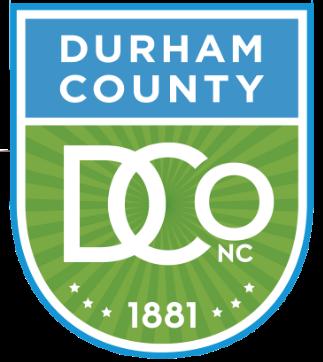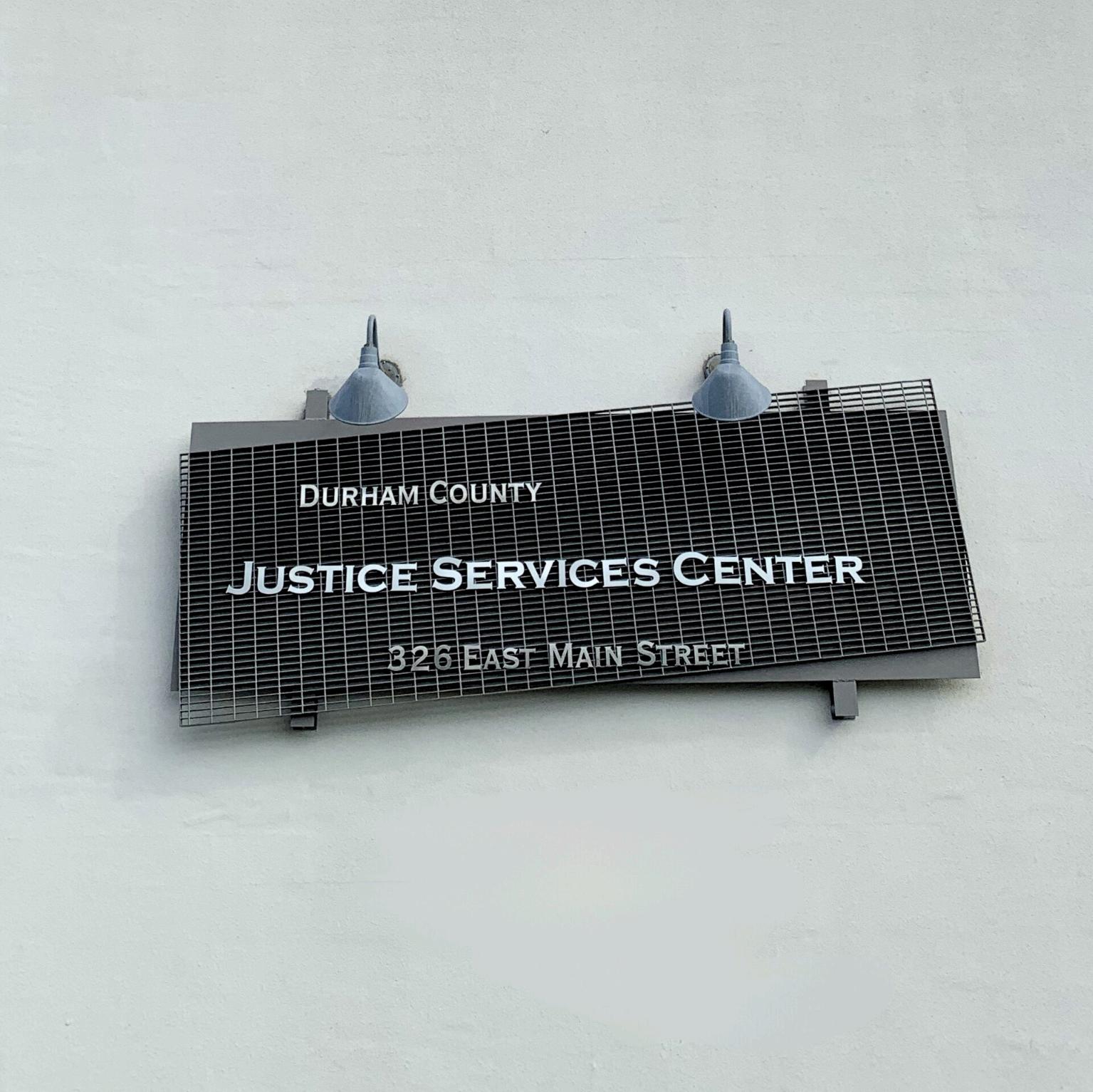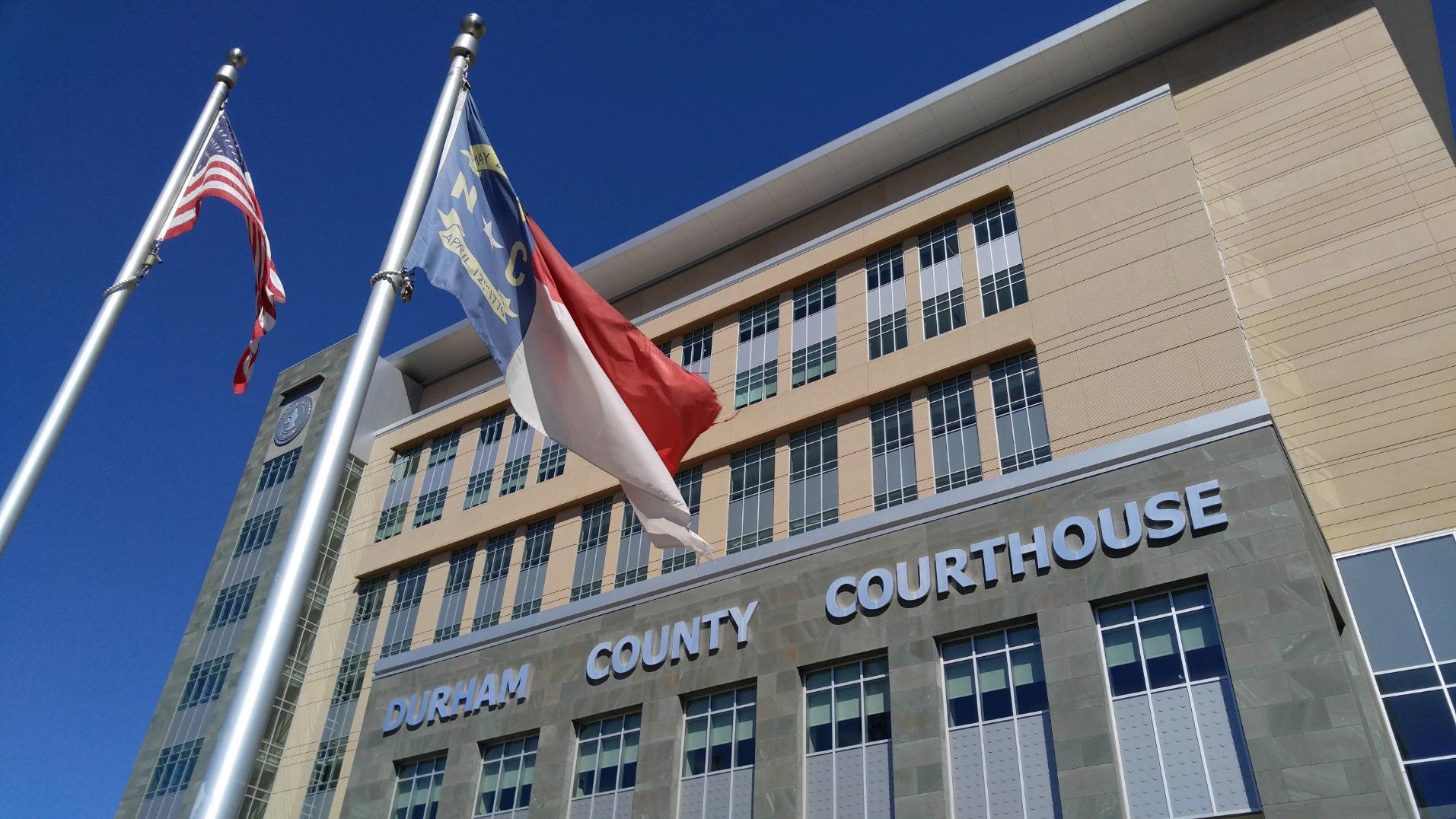







Dear Friends,
Every June, we close out our books and bring another fiscal year to an end. We celebrate our wins, examine our challenges, analyze our data, and begin strategizing for the new year. In Durham County, the summer is a time of both honest reflection and optimism for what lies ahead. However, this past June, we marked the end of an era and prepared to make our first bold steps in a new direction.
On June 1, we bid farewell to longtime Director Gudrun Parmer after 25 years of exemplary service to Durham County. Throughout her career, Gudrun worked tirelessly to transform the justice system through the development and implementation of innovative, person-centered programming for justiceinvolved individuals. For her staff, Gudrun was a leader, a mentor, and an advocate; for community organizations and elected officials, Gudrun was a trusted adviser and a dedicated partner.
June 30, 2023 marked our last day as the Criminal Justice
Resource Center (CJRC). As of July 1, 2023, we are the Justice Services Department (JSD). This new name, selected with the input of our community partners and approved by the Board of County Commissioners, was chosen to better reflect our role as a unit of Durham County government, honor our commitment to serving system-impacted individuals, and destigmatize justice involvement.
The following report shares the story of our final year as CJRC – our team’s perseverance and hard work, our fruitful community collaborations, and, most importantly, the successes of our clients. We are proud to have closed this chapter with bold ideas, enhanced service delivery, and care for those we serve. Our future as the Justice Services Department will be built on a strong legacy and an expanded vision for service delivery, client support and community collaboration. As Director, I look forward to advancing this work and embracing the challenges and opportunities of the years to come. I am grateful for your continued partnership and support as we create a more just, equitable, and thriving Durham community.
 Roshanna Parker Director Justice Services Department
Roshanna Parker Director Justice Services Department
JSD’s community-based programs support Durham County residents who are currently on supervised probation, post-release supervision, or parole, as well as individuals enrolled in diversion programs. Services include substance use disorder treatment, Cognitive Behavioral Intervention (CBI), case management, housing assistance, and wraparound services.
In CBI, participants are taught to examine their own thoughts and emotions, recognize when negative thoughts and emotions are escalating, and then use the strategies they learned to change their thinking and behavior.

162
55% total clients participated in CBI
89% completion rate for participants enrolled in Recidivism Reduction Services

completion rate for all other CBI participants
The Second Chance program offers outpatient substance use treatment services for justice-involved individuals ages 18 and up. Referrals come from Treatment Alternatives for Safer Communities (TASC), the Courts, and community service providers. After completing a comprehensive clinical assessment to identify their needs, participants enter either intensive outpatient treatment or regular outpatient treatment. Treatment services offered include substance use education, individual and group counseling, and Aftercare. Through this program, participants develop skills, knowledge, and connections to support their ongoing recovery.


unduplicated clients served

36%
148 of participants successfully completed the program
Durham’s Local Reentry Council (LRC) brings together individuals, community organizations, and government agencies to provide a wide array of services and supports for the justice-involved population, including people who are returning to the community following incarceration and individuals on probation, parole, or post-release supervision. LRC’s membership includes faithbased organizations, employment and career readiness programs, community colleges, housing communities, mental health and substance service providers, and more. Since 2016, JSD has served as the Intermediary Agency for Durham’s LRC and is responsible for managerial oversight, administrative support, fiscal accountability, and service coordination.
200 unduplicated clients served
82
40 employment placements
housing placements
Through this network of providers, the LRC offers short-term housing, transportation, employment assistance, childcare, and other basic needs. Last year, the program received 99 more referrals than in the previous year –representing a 39% increase year-over-year – and served a total of 200 individuals, a three-year high-water mark and a 41% increase from FY2022.
CALVIN’S STORY: Meet Durham County native Calvin, a resilient individual who defied the odds and is transforming his life after serving 26 months in prison. Released in 2023, Calvin embraced the opportunities offered by the Durham LRC to rebuild his life.
Upon release, Calvin tapped into the resources provided by the LRC and successfully completed the Local Reentry Council Employment Readiness class, enhancing his skills and preparing him for the workforce. Calvin enrolled in Durham Technical Community College and successfully obtained a forklift certification.
The LRC's partnership with HubZone Technology Initiative proved invaluable for Calvin, as he received a refurbished Chromebook computer, opening doors to further educational and employment opportunities.
Calvin is now gainfully employed with a construction agency in Durham. His success is a testament to his determination, resilience, and the unwavering support provided by the Local Reentry Council.
In his own words, Calvin expressed gratitude, stating, "The LRC is everything I expected it to be and more. The unwavering support has proven to be beneficial to my reentry journey. It gave me determination to keep striving to better myself even when challenges arose, I persevered, relying on the support of the Local Reentry Council."
ALLEN’S STORY: Allen's journey is a testament to resilience and the transformative power of community support. After serving 12 years and 7 months in prison, Allen, a Durham native, emerged into a world that had changed considerably. His reentry, however, was marked by support and opportunities provided by the Durham LRC.
Released in 2023, Allen faced the challenge of finding stable housing. The LRC stepped in, providing emergency housing assistance that led to his placement at Stick & Stay Prevention. This crucial support laid the foundation for Allen's successful reentry.
Recognizing the importance of employment in the reentry process, Allen enrolled in the LRC's employment training course. Equipped with newfound skills, he secured a position with a prominent building materials supply company. This employment not only provided financial stability but also a sense of purpose. The LRC's commitment extended beyond immediate needs. Allen was connected with NC Works, for additional employment resources and received assistance obtaining food stamps, easing the financial burden of his transition.
Allen's introduction to the LRC came through his parole officer, who recognized the value of the council's resources. Sharing his positive experience with the program, Allen Allen shared, "The LRC keeps me motivated. They provide me with attainable goals and make me feel like I can have a successful reentry process.
Although expanding affordable housing is a long-term City and County priority, Durham remains one of the most competitive housing markets in the country. The City’s Forever Home, Durham program, a $160M initiative launched in 2019 through an affordable housing referendum, set a number of ambitious goals for expanding housing and supportive services for low-income residents, including building 1,600 new affordable rental homes and moving 1,700 individuals and families experiencing homelessness into permanent housing. Despite progress toward these goals, many residents with low incomes and other barriers, such as criminal records, struggle to secure a safe, affordable home in a community that still has rental occupancy rate of 94% and extremely high rental costs.
As a result, staff across the department received more requests than ever for housing assistance. The Local Reentry Council (LRC) team alone placed 40 clients in housing in FY23, marking a 38% increase from the previous year. Our Specialty Courts teams also played a significant role in helping clients find and keep housing, with the Drug Treatment Court team providing over $14,000 in short-term housing assistance to nine clients – 18% of all active participants. Last fiscal year, a total of 46 individuals were placed at JSD’s Transitional House until they found either a new short-term placement or permanent housing. In total, these clients spent more than 1,500 bed days at the Transitional House in FY2023. On average, the Transitional House’s occupancy rate was 77.3%, a marked increase from the previous fiscal year’s occupancy rate of 57.6%.
Thanks to a recent ARPA award from the City of Durham, the Justice Services Department will be able to provide even more housing assistance in the year to come. JSD was one of six local organizations to receive ARPA funding from the City of Durham for Safe, Stable Housing projects. The funded program, Reentry Housing Support, is managed by LRC staff and offers emergency, short-term, and long-term housing assistance to individuals who are re-entering the community after incarceration. This funding also enabled JSD to hire a full-time LRC Housing Case Manager. Alongside the LRC Coordinator, the Housing Case Manager helps clients secure and maintain housing by cultivating strong relationships with housing providers, working with clients to identify housing goals, assisting clients with their housing search, and providing intensive case management for clients in need of housing.

Surpassing expectations, our Specialty Courts provided over $14,000 in housing assistance, aiding 18% of Drug Treatment Court participants in FY23.

A testament to our progress, the Transitional House's occupancy surged to 77.3% in FY23, reflecting our ongoing commitment to securing stable housing for our clients.
Since its inception in 2017, The Mental Health Court Diversion Program (MHC) has connected individuals living with Severe and Persistent Mental Illness (SPMI) or Serious Mental Illness (SMI) to mental health treatment and other supports, with a goal of improving participants’ health and well-being and reducing recidivism. Individuals who successfully complete the program are eligible to have their charges dropped. Through this program, clients have access to Medication Bridge services, Medication Assisted Treatment (MAT), individual and group therapy, evidence-based mental health and substance use treatment and education, case management services, crisis intervention, and basic needs assistance.
In 2021, JSD received a BJA grant to launch the Mental Health Court Expansion Initiative (MHCEI), an effort to serve more clients and enhance treatment options. This program is open to individuals who do not meet the MHC eligibility criteria, including individuals with more serious cases and those who have personality disorders, and prioritizes individuals who have co-occurring mental illness and substance use disorders. Following a yearlong planning phase, the team began program implementation in the spring. Part of this expanded programming included Anger Management, a new component added after a pre- implementation assessment conducted by UNC-Chapel Hill found this to be a service gap. Due to a demonstrated need for this service across the agency, Anger Management will also be available to all JSD clients.
34 unduplicated clients served
57% of participants completed the program

The Adult Drug Treatment Court (ADTC) has been a critical component of Durham County’s Continuum of Services for individuals involved in the justice system since its establishment in 1999. Through community partnerships, DTC connects participants to a wide variety of resources to help them successfully reintegrate into the community. DTC participants commit to a minimum 12-month program comprised of five stages, gradually decreasing the service intensity until clients successfully graduate.
Participants move through each phase based on their compliance with program rules and regulations, substance-free time, and individual progress. Drug courts are designed to reduce recidivism and alcohol and drug use while
49 unduplicated clients served

reducing the costs of drug-involved crimes and decreasing prison crowding.
FY2023 was a year of significant growth for the program. The Durham ABC Board, a longtime DTC supporter, awarded JSD a $60,000 grant to enhance DTC services. Through this grant, the team was able to increase the frequency of drug and alcohol testing, which now occur twice per week, and cover more laboratory screenings. Funding also supported MAT treatment, which is currently offered to DTC participants through partnerships with community-based providers. Beyond treatment and testing, the Durham ABC Board also provides significant client assistance funds that help cover basic needs for participants, including housing.
25% of participants completed the program
“This may take some time but always keep on keeping on because it ain't about how long it takes if you make up your mind to never stop trying. It was super hard at first because it seems like so much to do but once that same pattern of using drugs kicks in, I utilize the tools I learned at JSC to not use drugs and it's really easy when you have the support of DTC team. JSD staff are different because y'all actually care about us and that don't happen anywhere else.”
“The DTC program is great. At first, I didn't think so but now that I am taking the program serious; it saved and changed my life. I really think it is a GREAT program and recommend to those that want to change their life. I like the staff too; very supportive.
DTC Team CARES!"

COVID-19 continued to impact service delivery through much of the past fiscal year. While health and safety measures such as online programming and masking helped ensure continuity of care, many JSD clients struggled to adapt to this new services landscape; these changes, along with the temporary suspension of in-person community activities, often compounded clients’ feelings of loneliness and isolation.
In response, our teams made client engagement and social connectedness a focal point of their work in spring 2023, hosting a variety of prosocial activities and community gatherings for JSD clients. For justice-involved individuals, prosocial activities are an essential treatment component and crucially offer positive alternatives to risky behaviors and criminal activity.
Having seen the impact of the pandemic on participants’ mental health firsthand, Drug Treatment Court Coordinator Lentora Duncan prioritized building community among her participants. She spearheaded a variety of events to support clients’ health and well-being and help them rebuild their networks of support, such as ice cream socials, arts and craft projects, spirit days, and cookouts. These prosocial activities – along with other JSD events such as job fairs and round tables – are designed to increase participants’ engagement in services, help them find local resources, and give them an opportunity to socialize and get to know their peers.
Use Criminal Justice Program Manager Renee Shaw reported that these events were generally well-attended and that the majority of clients were enthusiastic about their experiences. “What was really exciting was seeing clients apply what they had learned. At our Bingo Night especially, I heard them repeat the language they had heard in their CBI classes. They were really communicating well,” she said.
JSD events not only offer a chance to learn and connect, but allow participants to show their creativity and express themselves in a supportive, informal setting. This art project, created by a Drug Treatment Court participant during a community event, represents his vision of what home looks like.
The Jail Mental Health (JMH) Team serves detainees who are either diagnosed with Severe and Persistent Mental Illness (SPMI) or on medication for Severe Mental Illness (SMI). All individuals booked into Durham County Jail are screened for mental health concerns, and JMH staff follows up with detainees who meet the program’s eligibility criteria. Last fiscal year alone, 2,452 individuals – over half of all jail intakes – were referred to the JMH program.
In addition to mental health programs, JMH works to stabilize inmates on psychiatric medication, offers discharge planning and connection to care, and delivers specialized programming for high-acuity detainees in
1,943 individuals screened of jail population received JMH services
338
45% unduplicated clients on JMH caseload
JSD events not only offer a chance to learn and connect, but allow participants to show their creativity and express themselves in a supportive, informal setting. This art project, created by a Drug Treatment Court participant during a community event, represents his vision of what home looks like.

104 individuals entered Therapeutic Housing Unit
The Substance Abuse Treatment and Recidivism Reduction Program (STARR), managed by JSD in collaboration with the Office of the Sheriff, is a substance use treatment program provided to inmates in the Durham County Detention Facility. STARR follows a harm reduction model and utilizes evidence- based practices developed specifically for justice-involved individuals living with substance use disorders, behavioral health issues, and criminogenic needs. The program provides therapeutic individual and group counseling, psychoeducational classes, and case management services, as well as offering access to Medication Assisted Treatment (MAT) through its partnership with the Sheriff’s Office.
In spring 2023, STARR enhanced its programming with the rollout of Screening, Brief Intervention and Referral to Treatment (SBIRT) services. Individuals are screened at the jail to identify any substance use issues and determine the appropriate treatment based on their risk level. For clients at low risk, no intervention is recommended. Brief intervention, consisting of 1-5 brief sessions centering on substance use education and motivation for behavioral change, is provided to individuals at moderate risk. Higher risk clients receive brief treatment, a series of short sessions that offer the educational and motivational components of brief intervention while addressing long-term substance use issues. Individuals who are identified as highest risk are referred to a substance use provider for more intensive services. Crucially, the addition of SBIRT allows for early identification of and engagement with individuals who are eligible for STARR.

104 unduplicated individuals served

83.5%
273 of STARR participants completed the program
According to the National Institute of Drug Abuse, half of all individuals who live with mental illness will also develop a substance use disorder at some point in their lives; similarly, an estimated 50% of individuals with substance use disorders are expected to develop a mental illness. When individuals living with behavioral health challenges do not receive the treatment and wraparound supports they need, they are very likely to become involved in the justice system.
A Pew research study analyzing data from 2017 – 2019 showed that adults with co-occurring mental illness and substance use disorders were arrested 12 times more often than adults who had neither mental illness nor substance use disorder, and over 1 in 9 adults with co-occurring substance use disorders were arrested each year. 60% of people with a mental illness who were arrested had a co-occurring substance use disorder. Specialty court participants are particularly likely to have co-occurring mental health and substance use disorders; nationally, as many as 30% - 40% of drug treatment court participants and 75% - 80% of mental health court participants live with co-occurring disorders.
To address the complex needs of this population, JSD has begun dismantling institutional silos and brought together its community-based mental health and outpatient substance use treatment services. For individuals with a dual diagnosis, integrated treatment – i.e., when an interdisciplinary team of clinical staff works in coordination to deliver appropriate mental health and substance use interventions – has been shown to yield better health outcomes, including reduced substance use, improvement in psychiatric symptoms, improved quality of life, and even reduced housing instability. This past March, longtime JSD staff member Renee Shaw was appointed as the Mental Health/Substance Use Criminal Justice Program Manager, supervising a team that includes substance use counselors, a clinical social worker, case management assistant, and the Mental Health Court Liaison.
JSD also ensures that detainees in the Durham County Detention Facility receive the behavioral health services they need to rebuild their well-being, prior to and after release. The Jail Transitions Team connects individuals returning to the community after incarceration to community-based services, serving as a bridge between the Jail Mental Health team and local behavioral health providers. In most cases, the Jail Transitions team begins working with detainees prior to their release date; after receiving a referral from the Jail Mental Health team, the Case Manager schedules an intake appointment with the individual to identify their needs, develop a care plan, and help them get connected to appropriate community resources. Once an individual is released from the Detention Center, a Jail Transitions team member meets with them to offer a warm hand-off from jail-based behavioral health services to a community-based provider. The team provides ongoing case management, transportation assistance, and other supportive services depending on the individual’s assessed needs.

Intertwined Challenges
Mental
Pretrial Services was established to create a systematic approach for release and community supervision for defendants who do not pose a risk to the community as they await trial. The aim of Pretrial Services is to reduce the overall jail population while ensuring that defendants appear for their court dates and are not a public safety risk while under pretrial release. By keeping low-risk defendants out of jail, Pretrial Services also generates considerable community cost savings. Last fiscal year, Pretrial Services saved 35,343 jail bed days –a value of over $7,000,000.
Pretrial Services has two key components: First Appearance and Pretrial Release and Supervision. At First Appearance, a judge determines the release or detention of each defendant, and bond amounts are reviewed. Defendants scheduled for first appearance who are willing to participate are interviewed to provide the court with stability factors, community ties, mental health history, and substance use disorder concerns. The judge weighs each of these factors when making bond decisions.
Pretrial Release and Supervision includes office and/or field contacts as deemed appropriate and referrals for services on an individual basis or as ordered by the court. Supervision levels and conditions of release are determined by the court upon review of the charge allegations, criminal history, and findings from the public safety assessments. Pretrial Services is also responsible for electronic monitoring of a small number of identified criminal defendants released by a judge from the Durham County Detention Facility as an alternative to incarceration pretrial.
unduplicated clients served
344 Public Safety Assessments completed
2,863 Interviews conducted
2,183 of enrollees attended court sessions until disposition
88% of defendants did not obtain a new charge before disposition
87% of clients successfully completed the program
61%
Bridging Transitions

Bridging gaps from jail to community-based health services.
On January 1, 2014, the Durham County Misdemeanor Diversion Program (MDP) changed how law enforcement dealt with 16-17 year olds after first-time misdemeanor offenses by allowing cases to be diverted from the courts into person-centered programming and, in turn, keeping participants’ criminal records clean. Since its inception, MDP has expanded numerous times to address presenting community needs. Today, the program primarily serves young adults ages 18-26, with older adults allowed to participate at officer discretion.
Following referral and intake, participants attend a community diversion program based on their individual needs and the reason for referral. If the participant does not comply or complete the assigned MDP program within 90 days, the referring officer will be notified and can opt to move forward in criminal court for prosecution. Once the participant successfully completes assigned MDP requirements, the case is closed out with the participant having no record or adult criminal history. Over a three-year period from FY 2020 – FY 2022, just 1 of 39 MDP graduates was rearrested within 12 months of completion.
27
unduplicated clients served

100%
of clients completed the Misdemeanor Diversion program

The Durham County Post-Arrest Diversion (PAD) Program, a joint initiative of the Durham District Attorney’s Office and JSD, assists individuals charged with lower-level felonies. PAD participants must complete a needs assessment intake, after which they are assigned to an appropriate community-based program to be completed within 4-12 months. Once a participant has successfully exited the program, the Diversion Coordinator notifies the District Attorney’s Office, and the prearranged agreement for the case is enacted. The PAD program is offered at no cost to participants or their families.
38 unduplicated clients served completion rate for PAD participants 73%
Since 2015, Durham County has been part of the Stepping Up Initiative, a nationwide endeavor to reduce the number of people living with mental illness in jail. Participating counties aim to achieve this by implementing effective, data-driven programs and policies for connecting people to the care and resources they need. Improved access to these supports leads to better health outcomes for people with mental health challenges and, in turn, fosters safer, healthier communities.
The Stepping Up Initiative Committee brings together representatives from local and state government agencies, law enforcement, the judicial system, the healthcare system, higher education, the faith community, and more to identify resources for individuals living with mental illness and/or SUD in the justice system and work to improve access to services.
The community’s efforts were recognized in September 2022 when Durham County was named a Stepping Up Initiative Innovator County – one of just 44 across the US and the sole innovator County in NC. This designation means that Durham County has the capacity to identify people in the county jail who have mental illness and substance use disorders, track and share this data to connect these individuals to appropriate services, and utilize the data collected to inform policies and procedures at the local level.
In an effort to reduce and prevent juvenile crime across the state, the NC Division of Juvenile Justice and Delinquency Prevention has established Juvenile Crime Prevention Councils (JCPCs) in each County.
Appointed by the Board of County Commissioners, Durham County’s JCPC has a diverse membership that reflects the Durham community, with representatives from County government, law enforcement, the legal system, healthcare providers, the faith community, education, and more serving on the Council.
The JCPC is responsible for conducting a needs assessment for youth who are either court involved or at risk of court involvement, identifying appropriate services and supports to address these needs, and awarding state funds to community organizations to support treatment, counseling, or rehabilitation services aimed at delinquency prevention.
Following a community needs assessment, the Durham County JCPC launched a competitive RFP process for youth-serving organizations to address the needs of court-involved and at-risk youth and fill service gaps. In FY23, JCPC recommended funding for the following organizations:
Our Diversion programs partner with a wide array of community partners. As we work to meet the needs of the participants we serve and victims/survivors in cases, we often have graduates of diversion come back to volunteer with the program.
This past year, we had a diversion participant complete our PAD program by doing therapy and restorative justice. He moved on to meet with the Executive Director of You and 5-0, training people how to have safer interactions with law enforcement. Currently, he is planning to volunteer with the Hayti Reborn Justice Movement to be a role model of change for young people in his community.’
This story is a beautiful reminder that not only is change possible, but we can never judge anyone based on a past mistake.
Kelly Andrews, Diversion Coordinator
326 E. Main Street
Durham, NC 27701
Phone (919) 560-0500
Email jsd@dconc.gov
Website dconc.gov/jsd
Hours
Monday - Thursday : 8:30 am - 8:30 pm
Friday : 8:30 am - 5:00 pm